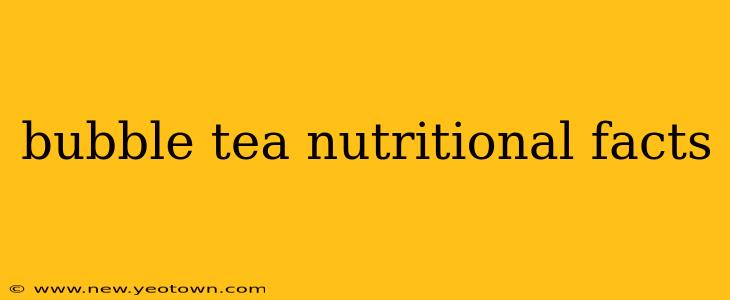Bubble tea, also known as boba tea, pearl milk tea, or simply boba, has taken the world by storm. Its delightful blend of chewy tapioca pearls, flavorful tea, and creamy milk (or milk alternatives) makes it a tempting treat. But beneath the sugary sweetness lies a question many wonder: what are the nutritional facts behind this beloved beverage? Let's unravel the complexities and explore the nutritional profile of this popular drink.
This isn't just a simple "calories" count; we'll delve into the nuances, exploring the variations and helping you make informed choices. Prepare for a bubble tea nutritional adventure!
What are the calories in a typical bubble tea?
The calorie count in a bubble tea is incredibly variable, depending heavily on the size, ingredients, and sweetness level. A small, unsweetened tea with a milk alternative might clock in around 100-150 calories. However, a large, sugary drink with extra toppings can easily exceed 500 calories – sometimes even reaching 700 or more! Think of it like this: you're essentially consuming a mini-meal in a cup. The added sugars and syrups contribute significantly to the caloric density. The type of milk used also plays a substantial role, with whole milk adding more calories than skim or plant-based alternatives.
How much sugar is in bubble tea?
Sugar is a major player in bubble tea's nutritional profile. The amount can vary dramatically. Pre-made syrups are often loaded with sugar, and even seemingly "healthy" options might contain surprising amounts of added sugars. Many large bubble teas can contain the equivalent of several teaspoons of sugar, sometimes exceeding the recommended daily intake of added sugar for many individuals. Always check the nutritional information if available or inquire about the sugar content when ordering. Choosing less sweet options or opting for sugar-free syrups can drastically reduce the sugar intake.
What are the ingredients in bubble tea?
The foundation of bubble tea is usually tea (black, green, oolong, etc.), but from there, the ingredients can vary greatly. Common additions include:
- Milk: Dairy milk (whole, skim, 2%), soy milk, almond milk, oat milk, and others.
- Sweeteners: Sugar, honey, agave, artificial sweeteners.
- Tapioca Pearls (Boba): These chewy spheres are made from tapioca starch.
- Toppings: Popping boba, pudding, jellies, fruit pieces.
Is bubble tea healthy?
The simple answer is: it depends. A small, unsweetened bubble tea with a milk alternative and minimal toppings can be a relatively lower-calorie, lower-sugar option compared to other sugary drinks. However, many variations are high in sugar, calories, and often lack significant nutritional value beyond carbohydrates. Regular consumption of high-sugar bubble teas can contribute to weight gain, blood sugar spikes, and other health problems.
What are some healthier alternatives to bubble tea?
If you crave the refreshing taste of bubble tea but want a healthier option, consider these:
- Reduce the sweetness: Order less sugar or opt for sugar-free syrups.
- Choose a milk alternative: Soy milk, almond milk, or oat milk generally contain fewer calories and less saturated fat than dairy milk.
- Select smaller sizes: A smaller size will naturally reduce the overall calorie and sugar intake.
- Make it at home: This gives you complete control over the ingredients and allows you to use healthier alternatives.
- Explore alternative beverages: Consider unsweetened iced tea, fruit-infused water, or smoothies with natural sweeteners.
Are there any nutritional benefits to bubble tea?
While bubble tea is not a nutritional powerhouse, some variations may offer minor benefits. For example, choosing a tea base with antioxidants (like green tea) can contribute to some antioxidant intake. However, these potential benefits are often overshadowed by the high sugar and calorie content in many bubble tea variations.
Bubble tea can be a delicious treat, but moderation is key. By being mindful of the ingredients, sweetness levels, and size, you can enjoy this popular beverage while minimizing its potential negative impact on your health. Remember to prioritize informed choices to maintain a balanced diet.

